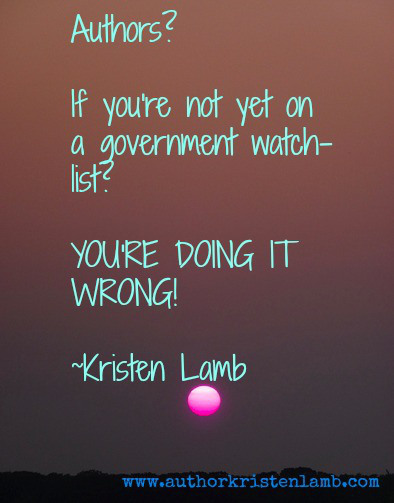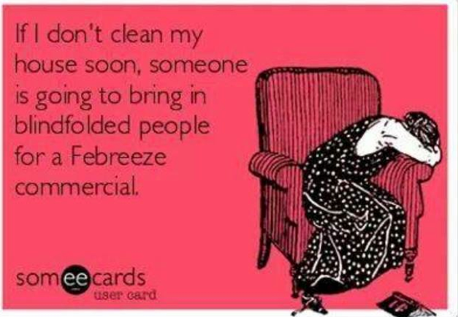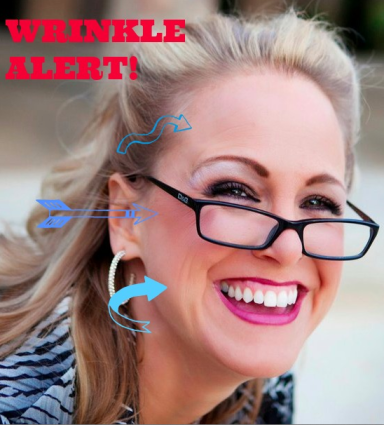Kristen Lamb's Blog, page 66
January 17, 2014
Author Beware—What to Look for in an Indie Publisher

Original image via Flickr Creative Commons, courtesy of geishaboy
On Wednesday, we talked about all the types of publishing paths and how the new paradigm is becoming increasingly flexible and author-friendly. There is no “right path” only a path that is right for you, which we will talk about in a moment.
To keep up with all the changes in The Digital Age, we created WANACon, which is a virtual conference and as close to the real thing one can get without a holo-deck. No travel, no hotel, from home, and all recordings are included so you can fit a writing conference to your schedule no matter where in the world you happen to live. Also you can listen to anything you miss or might need to revisit. Talk to agents, editors and professionals without ever stepping outside.
Over 20 presentations on craft, social media, platform-building, web design, cover design, and agents…delivered straight to YOU. No matter which publishing path you choose, WANACon has you covered—Traditional, Indie and Self-Publishing. Our Early Bird Special lasts through January 31st. Use the code EarlyBird for $30 off the $149. Sign up here.
Since WANA embraces publishing as a whole, we have USA Today best-selling authors, best-selling Indies and Self-Pubs. As I mentioned, WANACon has even recruited literary agents and editors to present and take pitches. We want the perfect fit for you.
Today, one of our presenters, PDMI Publishing is here to talk about the advantages of Indie Publishing and what to look for before you sign any contract (whether it is with them or another Indie Press).
I know PDMI is committed to writers. They’ve been very good to me and extremely supportive even though I’m not one of their authors and they make no money being kind to me. Even WANACon is almost 100% volunteer. It’s how we can keep the price affordable. Yet, PDMI is sending in an entire team to educate authors.
Take it away, Victoria!
****
Most of us go to work to pay the bills; if we get to enjoy our job, that’s a plus. If we’re passionate about what we do, that’s both unusual and remarkable. But should it be?
Many Indie publishers are guided by the idea that, if we’re going to spend so much of our lives working, why shouldn’t it be a pleasant experience? Passion is paramount. From the owner to the newest trainee editor, a good Indie team loves what they do, and they’re committed to the authors in their care.
Indie houses are in the pioneer stages of development, and this sense of being in at the start of things gives their products a fresh edge and encourages imagination. This is what makes dealing with an independent publisher so special for an author.
The question is, how does an author find the right fit? What can she hope for? What can she demand? At our press we look at three crucial areas of expertise, and we develop teams for each author based on her goals and the expertise required.
Step #1 Editing
This heart-wrenching but critical piece of any professional publication starts before the manuscript is submitted. First, an author needs to make sure – double sure – that her manuscript is in the best possible shape before it’s submitted. Check each press’s submission requirements and follow them closely. Indies are usually understaffed, so an author can lose a chance at getting an ideal fit simply because he/she failed to follow instructions.
Editing, a conversation between the author and her assigned editor, usually occurs at least twice. Many times the editor is paid from royalties, so he has a vested interest in the book’s success. The author should find a mentor; a guide–someone that allows that special voice to shine but brings polish and professionalism to the text. The process can take 3-4 months to complete.
No editor will make a good team member if he’s continuously harassed about a manuscript. On the other hand, the author should get an expected timeline for delivery and start checking if a deadline slips by. Find someone who can help you grow something other than gray hairs.
Step #2 Artwork
Indies also give an author an opportunity to express her work in illustrations and cover art. The author needs an illustrator that listens to her voice and happens to care what is actually in the book. However, it’s also important to listen to the pro when it comes to marketability. Remember, this is a team.
The Indie staff has a vested interest in the success of the book, so use their expertise. Indies might have several illustrators, and sometimes more than one will work on a book. The author should look for the partnership that makes her feel like part of the process, and not like a commodity. But listen to the artist – you don’t want your book to get lost in the crowd, and a stan-out cover that pops can be critical for success.
Artwork doesn’t stop at the cover or with a few illustrations. Formatting style can be the difference between looking like the book came off a copy machine at the library or looking like a crafted work, designed by someone with a passion for detail. Not all Indies spend a lot of time here. While searching for a team, consider purchasing a published book from the potential press. Does the work look like it can compete in the commercial market, or does it look like it came off a mimeograph machine?
Step #3 Marketing
The last component that our team focuses on is marketing. Kristen is the ninja when it comes to author strategies for marketing author brands and their work. Yet, an author still needs a publisher that is willing to support all that hard work. Indies have very limited resources for adverting, and they tend to use them judiciously, but there are many things that an author should expect as a bare minimum. Again, in this world, it should be a team or the author needs to keep searching. Not all Indies are equal in this most critical step.
The author should expect help to secure several reviews in different venues. There should be an active program to submit manuscripts for awards. At our press, the editorial department is responsible for selecting the book and the genre. Our authors can enter in more genres if they choose. We also help with special events, conventions, and signings.
Some Indies require their authors to have a webpage, some build them; still others offer training. In our case, we have a close-knit group that supports each other and shares ideas on how to get the book and the author in the public eye. Sometimes our clubhouse looks like Romper Room, sometimes the War Room; but we have fun and support each other every step of the way.
Writing is a lonely occupation, but for those who connect with one of the growing number of small independent publishers, it can become a bit like joining a family. There is a true sense of coming home and knowing that for all the employees of the firm, your success will be felt as their success. It’s what they come to work for and what makes dealing with them so rewarding.
Who are we?
We are PDMI Publishing, LLC; a place where team is a way of life, not a cliché. Our Marketing Team, Peter Wells and Daven Anderson, invite you to join the company at the Birmingham Public Library Authors Expo in Birmingham, AL on February 1, 2014. The Expo runs from 9:00 AM to 3:00PM. We’ll be taking Kristen with us! Well, at least we’ll have her latest book, Rise of the Machines, on hand. On February 2, some of our authors will be guests at 2nd & Charles in Hoover, AL for a book signing event from 1:00 to 3:00. You can also catch us at WANACon 2014!
Wherever you go, whatever you do with your career, stay true to yourself as your manuscript finds its way to market. Find a partner that helps you mold your thoughts into a professional and marketable piece of work. Here at PDMI, we’re happy to help you discover what path is best for you; this is where we “sculpt personal voices and visions into print.”
***
Thank you so much for your time. As a writer who was once Indie, I can attest these are all areas we must examine thoroughly before making any final decisions. It’s a lot of work writing books and building a platform. A publisher—ANY publisher—should make life easier. No press is perfect, but publishers can strive to always improve and innovate. My experience with Indie was very positive. I know there are many wonderful committed teams out there who love writers and love books.
What are your thoughts? The PDMI Team will be around to answer any questions and I look forward to seeing y’all at WANACon!
I LOVE hearing from you! Comments for guests get double points.
To prove it and show my love, for the month of January, everyone who leaves a comment I will put your name in a hat. If you comment and link back to my blog on your blog, you get your name in the hat twice. What do you win? The unvarnished truth from yours truly. I will pick a winner once a month and it will be a critique of the first 20 pages of your novel, or your query letter, or your synopsis (5 pages or less).
I hope you guys will check out my latest book Rise of the Machines–Human Authors in a Digital World and get prepared for 2014!!!!


January 15, 2014
Three Tips for Finding the Perfect Publishing Path
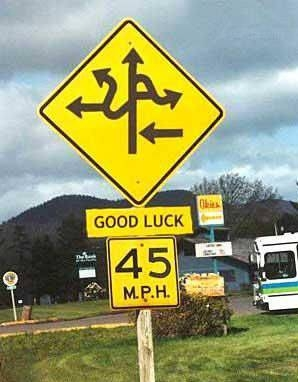
Publishing can feel a little like THIS…
We writers live in interesting times. The same digital tsunami that toppled Tower Records and collapsed Kodak has now consumed the world of publishing. The world we knew five years ago is gone. Traditional is reinventing, indie publishers are growing and self-publishing now can be a viable part of any author’s long-term career plan. This is one of the main reasons WANA has never taken sides and embraces publishing as a whole.
Granted, some authors may find a singular path that fits all their needs, but a majority of us will mix it up and venture on a hybrid path. Traditional houses are encouraging writers to self-publish prequels, short stories, or even stories involving supporting characters to keep the fan fires burning between books.
Indie houses are helping established authors breathe new life into backlists and new authors get a start under the care of professionals. Self-publishing is a fantastic way to begin and hone the skills required to be successful long-term (solid work ethic, business skills, social media, and thick skin). Sell enough books? Agents and editors will seek you out.
I began indie published, then switched to self-published because 1) I write about publishing so I wanted to experience the process of all paths and 2) my topic is time-sensitive 3) *hangs head* I’m a teensy tiny bit of a control freak. I LOVE being able to oversee artistic elements that, before, were out of my hands.
Yes, I wanted to be a cyborg. I have few goals in life, but being a cyborg was up there. I doubt NY would have permitted me to be a cyborg. They wouldn’t let me have a light saber either. Can we say deal-breaker?
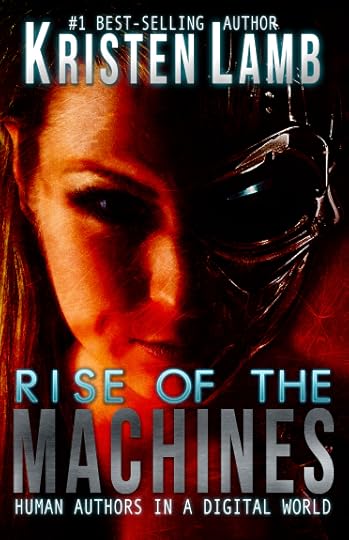
HA! Mommy-Bot!
Finding the perfect fit is a process and we will outgrow some choices. But, hopefully these tips can serve as guideposts to keep you on track ;).
#1 There is NO Until Death Do Us Part
We are not married to any publishing path. We will grow, our content will evolve and we might even have to completely change direction (like me deciding to self-publish). Writing is an art, but it’s also a business. Blind loyalty is not required.
Just because we change direction doesn’t mean that is set in stone either. Certain works, personalities and even what’s going on in our personal lives can affect which publishing path is the best fit.
Life can change on a dime. So can dreams and goals. We might be rocking self-publishing and then life tosses us in a Vita-Mix and we no longer have the focus and energy to maintain doing everything. Or, maybe you’ll begin being traditionally published then discover you want to write faster than the publisher’s schedule permits.
For instance, I’ve been approached to co-author a successful thriller series (short works). But, my 100,000 word mystery-thriller? Either I will self-publish or see if an agent thinks a traditional deal is better. I already reached my goal of being a cyborg, so “lack of cover art control” is less of a deal-breaker these days. I also am (blessedly) a lot busier. Thus, a slow path that would have driven me bonkers four years ago is looking a lot more appealing.
We live in a wonderful time where the works we create can find the perfect partnership and so can we. For the first time in history, publishing can be tailored to our works, needs and lives.
The new paradigm can be frightening, but the cool news is it is far more flexible.
#2 Ignore Peer Pressure
I speak at conferences and meet all kinds of authors. Writers who’ve found a great path are often the best evangelists, but there is no One-Size-Fits-All in publishing. Our friends and colleagues can offer advice, connections and guidance, but we have to be strong enough to do what we believe is best for our careers.
It was hard for me to step away to self-publish. I had NY agent friends who assured me that I could get a NYC traditional deal and implored me to reconsider. But, I’d already spent over two years sitting on Rise of the Machines—Human Authors in a Digital World. I needed to move on.
Though everything in me wanted to be a Random-Penguin, I knew it wasn’t right for this book. It was terrifying stepping out alone. Others might mean well, but we have to make our own decisions because only we will face the consequences (or reap the rewards).
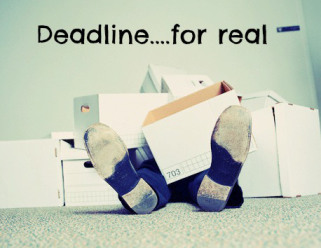
Original image via Flickr Creative Commons, courtesy of Stoere Schrijfster.
#3 Be A Realistic Dreamer
We all hear the stories of the “overnight successes,” but those are the outliers. I encourage all of you to dream. Dream BIG while you’re at it. Ignore the naysayers, because they’re mostly jealous chickens. It takes guts to do what we do. There is no magic marketing plan, no algorithmic alchemy guaranteed to catapult us to fame and fortune. This is a business. Writers (books) fill intellectual or emotional needs.
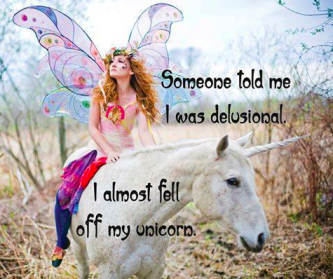
Image with Twig the Fairy
There is no rhyme or reason to what sells or what might become popular because we live in an ever-shifting world filled with people who have free-will. We never know what genre/story will speak to an audience, which is why we should simply write what we are called to write. There are a lot of components we simply cannot control.
If society is in great political upheaval, the last thing they might want to read is a dystopian. But? Things settle down and it might be the next big thing. Demand is often influenced by societal factors, the economy, current events, or even flukes. This is why it’s critical to ignore all that noise and focus on the areas we can control: platform, craft, publishing, etc. Focus on the business of our business and keep writing.
I’m not particularly worried about competition. Books are not so cost-prohibitive readers can’t buy more than one. Yet, aside from this, most people will give up. Long-term success as a writer (or anything) is a formula:
Self-Discipline + Teachability + Tenacity + Talent= Success
Talent alone is useless without the other components. I’ve met many talented writers who will never succeed because they don’t finish anything. I’ve met tenacious authors who work their fingers to the bone, but aren’t teachable. They believe more advertising will increase sales, when the tough truth is they need to focus on craft. Or, perhaps the first book is fantastic, but many writers stop there and spend every bit of energy on marketing ONE book.
This new paradigm will weed out those who are writing for the wrong reasons. Whenever we decide to become writers, we need to inspect our motives. Are we writing because we LOVE to write? Would we still do it if we never made money? Do we have something to prove?
Agendas will affect the dream.
We are entrepreneurs. I’ve met small business owners who went bankrupt because they went into business so they could work when they wanted to. Problem was, they never worked. We need to always review why we are here, why we have THIS dream, and make sure it’s driven by motives that can withstand heat, pressure and time. Can we maintain discipline and enthusiasm during The Lean Years?
I want all of you to live the dream and love your work. We have to spend most of our lives working anyway, so why shouldn’t it be fun? Something we are passionate about? This is why we need to make certain we are educated enough to make sound career decisions. Few things can make us more miserable than being trapped on the wrong path (been there). This is why I am offering new class Many Roads to Rome—Which Publishing Path is Best? January 25th (which is a Saturday). Use WANA15 for 15% off.
What are your thoughts? Have you been confused about all the options? Tempted by peer pressure? Have you found a wonderful fit? Why does it suit you? Have you had to change your path/plans? Why? What drove your decision?
I LOVE hearing from you!
To prove it and show my love, for the month of January, everyone who leaves a comment I will put your name in a hat. If you comment and link back to my blog on your blog, you get your name in the hat twice. What do you win? The unvarnished truth from yours truly. I will pick a winner once a month and it will be a critique of the first 20 pages of your novel, or your query letter, or your synopsis (5 pages or less).
I hope you guys will check out my latest book Rise of the Machines–Human Authors in a Digital World and get prepared for 2014!!!!


January 13, 2014
The Tips to Maximize Conflict in Your Novel
Whenever I blog about craft, I’m coming from the perspective of a long-time editor. I do understand that the creation process is vastly different from the editing process. I know this because I’ve been on both sides. But, if you want to minimize revisions and rewrites, it helps to have some basic editorial skills in your toolbox.
Since many of you might want to pursue self-publishing, you’re wise to hire an outside editor. The cleaner the text, the lower the bill. Even if you want an agent or to traditionally publish, the tighter the writing, the better the odds your work will earn positive attention.
Line-edit is important and no longer my area of expertise. I put commas everywhere and pay other editors the move them where they need to be. Typos happen even to the best of us. Right now, I’m editing my almost 100,000 word mystery-thriller and *head desk*. We all need a good editor. In the past 12 months, I’ve written well over 600,000 words. Yet, even with all this practice? I oops. You will oops. It happens.
Today, we’re going to talk about ways to up the tension and conflict. Conflict is what draws a reader in, what keeps them turning pages. When the conflict lags, so does the reader’s attention span. A good beta reader or content editor is a great ally for spotting these literary doldrums. I’m here to offer some guidance how be your own content editor before you pass your work onto another pair of eyes.
Tip #1—Perfect is Boring
Everyone has baggage and people who don’t aren’t the mettle of great fiction. Decisions are driven by life experiences good and bad (for fiction, bad experiences are more interesting). We don’t need to have a character who was beaten in foster care to have “issues.” We’ve all had our hearts broken, been betrayed, or even been around people who measure us against impossible standards.
A character can be impulsive because she came from a household that was far too structured. He can refuse to trust because his last job brought him in for a glowing quarterly review, only to fire him the next week. She can refuse to give in to love because she’s been self-sufficient so long she fears losing freedom.
Never underestimate the little things that can propel decisions (particularly bad ones). Many readers can’t relate to fifteen years of horrific sexual abuse, but they can easily relate to a parent, guardian or former love who was never pleased and withheld affection. They can connect to a character who’s deeply insecure because of being compared to a sibling.
I’m not saying we can’t have characters with nightmare backgrounds, but it isn’t mandatory. What is mandatory is that a character arc. If we begin with a fully actualized protagonist, then there is no way to grow, thus no crucible. The plot problem should be what fires away character flaws (refusing to be a team-player, unwillingness to trust, blind loyalty, etc.) and transforms a protagonist into a hero.
Tip #2—Some Personalities Naturally Clash
Every scene should have conflict. Conflict doesn’t need to be aggressive. Allies are often the best source of conflict in our arsenal. Think of the Pirates of the Caribbean movies. Captain Jack Sparrow isn’t the protagonist, but he creates a lot of tension because he’s utterly unpredictable. Allies never know if he’s going to sell them out to the bad guy, and often when he does, he comes to the rescue. He’s completely selfish, or is he?
If your protagonist is a paladin—embraces order and predictability, follows the rules, doesn’t like surprises—then a natural ally would be the maverick/loose cannon, the character who believes rules are “more guidelines.”
According to the Myers-Briggs, I score dead-even as an ENFP or INFP. While the MB jury is out as to whether I am an introvert or extrovert, I am off the charts on intuition. I make most of my decisions based off my gut. This gives my mom and brother—both ESTJs—a twitch. Why? We are polar opposites. I could care less about graphs, numbers and charts. My mantra?
There are lies, damn lies and statistics. ~Mark Twain
But? My mom, brother and yes, my husband, looooooove charts, Excel and bar graphs. Those closest to me process information and make decisions very differently than I do. This means, if I want them to be on the same page as I am? I have to write lists, show numbers, etc. Otherwise? We might as well be speaking two different languages. I speak the heart and they speak the head…and trust me when I say this has lead to a lot of conflict and misunderstandings.
Think Captain Kirk (all instincts) and Spock (all logic). We don’t need a ship of ticked off Klingons for all the tension. The dynamics between Kirk and Spock also propel the story and generate dramatic tension.

You’re being highly illogical.
If your character is a homebody? Pair her with a nomad. If he’s a rebel? Pair him with a rule-follower. You get the idea :D.
Tip #3—Nothing Worth Having Comes Easily
There is a difference between a “bad situation” and “conflict.” I recently beta read a book and part of my feedback was, “Everyone gets along too much.” Always run this simple litmus test:
“My character wants X, but then Y happens.”
It can be big stuff. Your character finds a key piece of evidence but then bad guys show and torch the place along with the proof of murder before a CSI team can get there. It can even be little stuff. Your protagonist needs to be able to unravel some problem and can’t think with noise, but one of her allies babbles like an idiot when nervous. Setbacks and roadblocks will intensify a story. Get your protagonist so close to what she wants she can taste it, then take it away.
[image error]
Image via Pixar’s movie “Finding Nemo”
Also, by mixing big problems with small problems, you will be able to better control the pacing of a story. If everything is a fight scene or car chase, it not only wears out a reader, it can quickly get boring. That is actually my complaint with the later Pirates of the Caribbean movies. Great stories, but another sword fight? I could only watch Sparrow swinging from ropes so long before it became tedious.
Whenever I do content edit, these are some of the areas I hunt for. A victim writer might get comments like “Too perfect” “Okay, I’m asleep” “Nothing happening” “Why does everyone get along so well?” Yet, whenever you do your own revisions, these are areas you can easily fix yourself. Even I am slashing through my novel looking for the Doldrums of Nothing Happening.
Do you have personalities that just hit you like industrial sandpaper? Maybe you are highly organized, but have a sibling couldn’t find her own butt with a flashlight and Google Maps? Can you think of people you know, but there is conflict because you process information differently? Is your partner (spouse, boyfriend, girlfriend, etc.) a person you like, if they didn’t drive you NUTS?
I LOVE hearing from you!
To prove it and show my love, for the month of January, everyone who leaves a comment I will put your name in a hat. If you comment and link back to my blog on your blog, you get your name in the hat twice. What do you win? The unvarnished truth from yours truly. I will pick a winner once a month and it will be a critique of the first 20 pages of your novel, or your query letter, or your synopsis (5 pages or less).
I hope you guys will check out my latest book Rise of the Machines–Human Authors in a Digital World and get prepared for 2014!!!!


January 10, 2014
You Know You’re a Writer When…
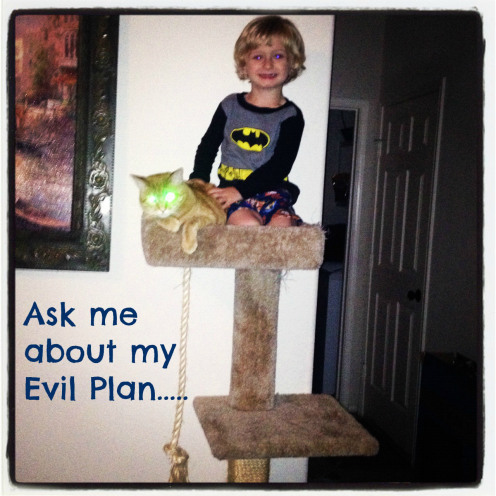
The Spawn and his minion Lazr Cat.
We’ve been talking about some heavy stuff the past several posts, so I figured it was time for a bit of levity. We writers are different *eye twitches* for sure, but the world would be SO boring without us.
You Know You’re a Writer When…
You’ve learned that regular people are cute, and no longer get offended with this conversation.
Regular Person: What do you do?
Writer: I’m a writer.
Regular Person: No, I mean, what’s your real job?
You’ve come to understand that writers are a lot like unicorns. Everyone knows about them, they’ve simply never seen a REAL ONE.
You Know You’re a Writer When…
The NSA, CIA and FBI no longer bother with you. Likely, they know you by name and now outsource to the creepy ice cream truck to just make a few passes and check to make sure you’re still at your computer.
You Know You’re a Writer When…
When it comes to revisions, you actually contemplate hanging one of those cheap pine tree air fresheners around your neck because bathing or showering or eating or changing clothes will interrupt your mojo.
You Know You’re a Writer When…
You’re on such a roll with the WIP that you’ve forgotten a “real” world exists (including laundry). You’re down to wearing your husband’s socks and he’s either going commando or is forced to wear that thong given to him on his 40th birthday as a joke gift. The kids? Hell, they went feral a week ago.
You Know You’re a Writer When…
You take a break from writing to go to the store and, on the way, begin untangling a plot problem. You finally realize you’re in the next state and have no idea how you got there. But good news is, you now know which poison is best to kill off the character modeled after that cheerleader who bullied you through high school. It’s the poison that will make her fat and wrinkly before she dies slowly from terminal acne.
You Know You’re a Writer When…
You appreciate that if Febreeze is good enough for the couch, why not hose the preschooler? Hey, you spent extra for the anti-microbial one. It kills germs *rolls eyes*. Now your tot smells like a Hawaiian Breeze and his cooties can’t hurt others. You should get a freaking MEDAL for this kind of creativity.
You Know You’re a Writer When…
You’ve been diagnosed with Tourette’s, Multiple-Personality Disorder or both. It’s tough to explain you were simply working out dialogue when strapped to a gurney. But the upside is when they sedate you, it’s the only vacation you’ve had in months and insurance might even cover it. SCORE!
You Know You’re a Writer When…
You’re no longer invited to family events because they can’t take the incessant correction of their grammar.
Chickens are done, people are FINISHED.
You Know You’re a Writer When…
You’re automatically safe from any episode of Hoarders because when you get enough books? Others naturally assume you’re a LIBRARY. Hey, maybe you can apply for government funding. Scratch that. Then, you’d have to let people borrow your books.
You Know You’re a Writer When…
You willingly suffer frostbite hiding in a grocery freezer eavesdropping a couple’s fight, because dialogue that epic is worth a losing pinkie toe. Your coffee table’s already tried to assassinate it 342 times anyway.
You Know You’re a Writer When…
You’ve been mistaken for Gollum multiple times, because strangers found you in a dark corner whispering “My precious….” and it was just you and your Kindle.
You Know You’re a Writer When…
You plow over the entire Kardashian family, because OMG there’s DEAN KOONTZ!
You Know You’re a Writer When…
Your idea of fun is reading the Diagnostic and Statistical Manual of Mental Disorders, talking to your friends at the Coroner’s office or reading/writing Amazon reviews of the Bic Pen for Her or the Hutzler 571 Banana Slicer.
You Know You’re a Writer When…
Speaking of the Hutzler 571 Banana Slicer, you actually bought one, not only to support the greatest comedic writing in human history, but also to screw with the TSA. Can you get it through airport security without a full-body search? Hide it near your shoulders and FREE NECK MASSAGE!
You Know You’re a Writer When…
You’ve made it onto the Mormon and Jehova’s Witness DO NOT CALL LIST because you will only promise to convert with purchase of YOUR BOOKS (and favorable 5-star reviews).
You Know You’re a Writer When…
You watch the reality show Oddities and recognize your friends and a few members of your critique group. “Hey, are they buying that used straight-jacket and shrunken head for me? Awww, how thoughtful…”
You Know You’re a Writer When…
Every time some overblown Third World dictator threatens to destabilize the world, all you can think is, “Pfft. Amateur.”
Have any to add? I know you do. So, “You Know You’re a Writer When….”
I LOVE hearing from you!
To prove it and show my love, for the month of January, everyone who leaves a comment I will put your name in a hat. If you comment and link back to my blog on your blog, you get your name in the hat twice. What do you win? The unvarnished truth from yours truly. I will pick a winner once a month and it will be a critique of the first 20 pages of your novel, or your query letter, or your synopsis (5 pages or less).
I hope you guys will check out my latest book Rise of the Machines–Human Authors in a Digital World and get prepared for 2014!!!!


January 8, 2014
Refuse to be Homogenized—Beauty, Bullying and Media “Mean Girls”
Me at 5’3″, 168 pounds and a Size 10-12.
Sigh
I’ve given up on women’s magazines. I tried buying a handful of copies of More? *rolls eyes* This was supposed to be a magazine that catered to women 30 and over. The issues I purchased mostly had pictures of food. Recipes. Diets. Craft projects. Face-scrubbers.
Have a hot 45-year-old in a sexy lingerie ad? Are you nuts?
When women’s magazines have an article about how to do our makeup as we age, do they have a 40-something model? NO. A twenty-something (ok, we can throw in a Hollywood starlet “repaired” with plastic surgery).
W…T…H?
I also bought a copy of Women’s Health. As an athletic/curvy woman, I have a hard time finding clothes. I can be 100 pounds and still have a butt and thighs and wide shoulders and big arms (um, look at my wedding picture). So, in this past October’s issue, WH had this feature of dress clothes for the athletic woman. Did they use any of the gorgeous muscular women from their workout routines or ads? Nope. They used six-foot tall toothpicks.
Oh, and they were all super-young because we all know any woman over thirty is a fat slob who lives in sweatpants and wolfs down donuts daily. DUH.
Have We as Consumers Unwittingly Encouraged This?
We’ve allowed Hollywood and Madison Avenue and the fashion industry to tell us that anorexia is healthy and aging women should be hidden. They are at least classy enough not to recommend a burkha. Our culture treats aging like ebola. With all the creams, surgeries, injections and procedures, one might think growing older was a disease. We’ve shamed women about their bodies and faces so they’ll line-up and hand out cash for creams, diets, magazines and surgery.
I’m not quite sure, but I think smile lines might be captured in a tube at the CDC somewhere deep in the belly of the Earth, cached away with smallpox and Spanish Flu.
What this “bullying” has created is a generation of older women who either give up or go to extremes and even plastic surgery addiction (um, Jenna Lee?). Young girls are lining up for breast implants even though their bodies have yet to fully develop. Truly athletic women live in yoga pants because one can’t have muscles and wear Matchstick Jeans.
Oh, but even yoga pants are no longer safe. Lululemon’s CEO blamed the “piling” of their overpriced yoga pants on women’s thighs and bodies (not the quality or lack thereof regarding the product). I’ve been 11% body fat before and my thighs still touched.
*GASP* THE SHAME!
Benevolent Bullies
And if we don’t fit the “Hollywood Image”? Angels with plastic surgery skills will step in and help the hideous. Maybe I’m missing something, but when one of my Facebook friends posted this article in Today Health, I wanted to cry: Tormented over their looks? Bullied teens seek free plastic surgery from a NYC nonprofit.
This young teen, first of all, had yet to fully grow into her looks. I was actually kinda goofy-looking when I was her age. When I was her age, I’d also suffered my front teeth knocked out when I was 8 and my nose broken at 10 (so I had a crooked nose and gapped teeth for a time). I never had braces or surgery on my nose. Time allowed me to “grow into my face” so to speak.
This girl was beautiful, but the surgeons benevolently made her “more acceptable.” Boy, I bet the bullies cheered when they could cower someone into slicing up their face for “approval.”
She didn’t have a cleft palate or an extra ear. She had a unique nose.
Why are we allowing this homogenization?
A Jewish nose or Armenian nose or an African nose is just as lovely and far more interesting than a fake Hollywood nose. Sarah Jessica Parker is an actress I respect and admire. She has embraced her lovely and distinctive features and continues to have a great career. On the other hand, Jennifer Grey (from the original Dirty Dancing) gave into the pressure of bullying and traded being a stunning Jewish woman to be a “cute white girl”…and hasn’t really worked since.
Embrace gaps in teeth, different noses, freckles, curves and wild, curly hair. Embrace the naturally super thin gal as well as the gal with curves. There are all different kinds of beauty and we are missing that as a culture.
Be brave!
Refuse to Give in to Bullies
Write to the editors. Stop buying magazines who don’t represent you. Complain to store managers. Refuse to allow cultural bullies to make you a drone. We should not permit bullies to create the agenda or affect our behavior.
And I’m not saying I don’t highlight my hair, use creams to take care of my skin or exercise so I can age well. I stay out of the sun, take loads of vitamins and kale and my Vitamix are my best friends. But where I see the problem is instead of being shown how to look great and age well we’re brainwashed into believing we shouldn’t age at all. I have NO CLUE if I look good for my age. Everyone is Photoshopped or Botoxed. What does a healthy weight even look like?
Granted, I’ve used tools on Pic Monkey to brighten the light, enhance the color of the image, erase smeared mascara/eyeliner, cover a blemish or crop a good picture taken from a bad angle that makes my arm look like it’s the size of a small oak, but I leave my smile lines. I earned them.
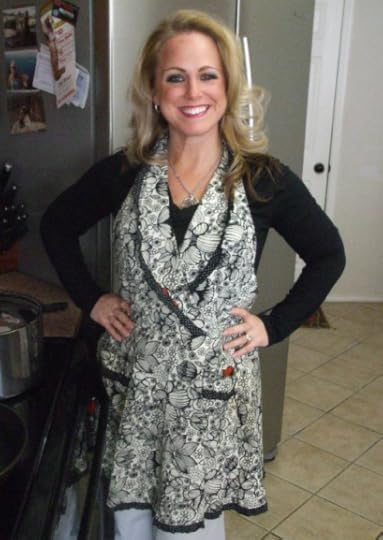
Me at Size 12 with….neck wrinkles *hides face*
I’m not opposed to plastic surgery, creams, botox, etc. so long as our decisions are for healthy reasons. For instance, if I ever start looking like an issue of National Geographic? Breast augmentation might be a consideration :D. But my desire is to be the best darn looking 50 or 60 year-old I can be, not to try and look like I’m 20 (and only end up looking bizarre).
When It Comes to Blogging/Writing
Blog. Write what you want. Wear what you want. Laugh a lot and make some smile lines. Be you. There is only ONE, you know ;). You are precious, unique and one-of-a-kind. There will never in human history be another YOU.
And THAT is super cool.
If you blog, don’t shut down your comments because of fear. Then you are allowing bullies to deprive you of the joy of a wonderful, loving, supportive community. THEY WIN. When their behavior makes us alter our lives, or harms our self-esteems? They score bully-points. Whether they can get us to change our habits (hiding in a library, avoiding the coffee break room), our on-line activity (shutting down comments or taking down a site or profile) or even harass us into needless surgery, THEY WIN.
Regular bullies profit from shaming others because of the high it gives them. Bullies in the form of corporations, advertising, the fashion industry, magazines and surgeons profit from shame with…um, money.
We can be the change we seek.
So many of you make me SO PROUD when you dare to write stories with characters who are different, older, ethnic, overweight, clumsy, etc. You show the light beyond the surface so keep doing it!
What are your thoughts? Have you given up buying clothes? Given up on “women’s” magazines? Do you feel our culture is driven by bullying because it creates insecurity which equals profit? Do you have children and what are you doing to help them feel good about who they are and resist the Drone Deception? Are you tired of all actresses and models looking like they fell off an assembly line? Do you have a hard time finding clothes? Do you write (or enjoy) characters who are different? I, personally, LOVE writing love stories with seniors (two have won awards).
I LOVE hearing from you!
To prove it and show my love, for the month of January, everyone who leaves a comment I will put your name in a hat. If you comment and link back to my blog on your blog, you get your name in the hat twice. What do you win? The unvarnished truth from yours truly. I will pick a winner once a month and it will be a critique of the first 20 pages of your novel, or your query letter, or your synopsis (5 pages or less).
I hope you guys will check out my latest book Rise of the Machines–Human Authors in a Digital World and get prepared for 2014!!!!


January 7, 2014
Want More Writing Success? Learn to Be a QUITTER

Image vis Flickr Creative Commons, courtesy of Yuya Sekiguchi.
Ah, the New Year is upon us. Most of our resolutions revolve around grabbing hold with a death-grip and vowing to never let go. When it comes to losing weight, getting out of debt, or discovering if our closets actually have floors? This is a good plan. Yet, when it comes to our careers? Never giving up might keep us from ever succeeding.
Want to know the secret to success? Quitting. Yes, you heard me correctly. And, if you’re a creative professional, it is in your interest to learn to get really good at quitting. Maybe you’ve felt like a loser or a failure, that your dream to make a living with your art was a fool’s errand.
Ignore that junk and understand…
Winners Quit All the Time
I posit this thought; if we ever hope to achieve anything remarkable, we must learn to quit. In fact, I’ll take this another step. I venture to say that most aspiring writers will not succeed simply because they aren’t skilled at quitting.
Ooooohhhh.
Learning Discernment
One problem many artists have is we lack discernment. It’s easy to get trapped in all-or-nothing thinking. If we defy family in pursuit of our art and something stops working properly, out of pride often we will persist even when the very thing we are attempting is the largest reason we will fail.
We keep reworking that first novel over and over. We keep querying the first novel and won’t move on until we get an agent. We keep writing in the same genre even though it might not be the best fit for our voice. We keep marketing the first self-published book and don’t move forward and keep writing more books and better books.
Learning to Quit is the Surest Insurance Against Failure
I like to say, “Persistence looks a lot like stupid.” The act of never giving up is noble, but never giving up on the wrong things is a formula to fail. We have to learn to detect the difference between quitting a tactic and quitting a dream.

Original image courtesy of flowcomm, via Flickr Commons
If I am trying to climb Mt. Everest, but I am repeatedly failing at climbing the one side, which is a sheer rock face with no way to get a footing, then it is suicide to keep trying the same thing. If, however, I regroup, hike back to the bottom and take another way up the mountain, I am a quitter…but I am NOT a failure.
In fact, in order to “win” I must “quit.”
Learn to Quit from the Best
Most of us are lousy at knowing how and when to quit. This is one of the reasons it is a good idea to surround ourselves with successful people, because successful people are expert quitters. When I started out, I had all the wrong mentors. I had writer pals who quit writing when it was boring or who quit querying after a handful of rejections. They quit attending critique because they got their feelings hurt when people didn’t rave their book was the best thing since kitten calendars.
All this wrong kind of quitting is easy to fall into. Excuses are free, but they cost us everything.
My Life Changed When I Changed the Quitters in My Company
It all started with the DFW Writer’s Workshop. I attended and met people living the life I wanted to have…the life of a professional writer. They were the same as me, and yet very different. When I went to DFW’s conference–which I HIGHLY recommend so sign up NOW for the May conference (I will be there, oh and Donald Maass and Les Edgerton, too)–I found myself being pushed to yet a higher level.
I met and stalked Candy Havens. Candy is an excellent quitter. She wrote her first bad book and didn’t spend the next six years trying to resurrect it. She sought training and experts and moved forward. She quit outside hobbies and friends that took away from her goal of becoming a professional author. Theresa Ragan was rejected by traditional publishers for over twenty years. She finally self-published and has now sold hundreds of thousands of books. NY tried to offer her a contract and she turned them down.
I turned in a hundred page proposal for Rise of the Machines—Human Authors in a Digital World in the summer of 2011. But, after NY ignoring it for over two years? I published it myself. We need to always be moving forward, and sometimes pressing on requires letting go. We can’t grab hold of the new if we are hanging on to the old.
If something isn’t working QUIT. Move on! If we have to defend and justify what we are doing there’s something wrong.
Everything is Our Enemy
It’s hard to know when to quit. I’m a loyal person. I’m loyal to a fault and I struggle every day with this lesson. But I’ve recently come to a conclusion. People who reach their dreams don’t get there by doing EVERYTHING. Everything is dead weight. Everything will keep us from focusing. Everything gets us distracted.
Everything is the enemy.
Sometimes we need to let go of inefficiencies or false trails, and if we don’t let go, then failure is just a matter of time.
Artists Actually Need More Quitting
Quit your day job. Today. This moment. Now, by quitting, I don’t mean you should throw your laptop in a waste can and take a bat to that copy machine that’s eaten every presentation you’ve tried to photocopy since the day you were hired….though that might be fun.
No, I mean mentally QUIT, then hire yourself to the dream. Screw aspiring. Aspiring is for pansies. It takes guts to be a writer. It takes guts to be any kind of creative professional. Hire yourself to the job you dream about. TODAY.
A couple years ago, I presented at the North Texas RWA Conference and I heard the best term EVER. No aspiring writers, only pre-published writers. If you want to be a professional author, you must quit to win. The day job is no longer the ends, but rather the means. The day job is just venture capital funding the successful art-making business…YOU.
You are a pre-published author…who happens to also be a stay-at-home-mom, a computer programmer, a salesperson, a whatever.
Learn to Quit Being “Everything”
Again, Everything is the enemy. Friends and family will want you to keep being the maid and the taxi and the babysitter and the buddy who can spend all day shoe-shopping. Many of us will try to keep being Everything to everyone and we’ll just try to “fit in” writing, but that is the lie that will kill the dream. We can’t be Everything!
We must learn when to quit and to be firm in quitting. Others have the right to be disappointed, but they’ll get over it. And, if they really love us they will get over it quickly and be happy for our resolve to reach our dreams. If they don’t? They’re dead weight and it’s better to cull them out of our life sooner than later.
Yes, this is hard stuff. Reaching our dreams is simple, but it will never be easy ;).
So what are some of your quitting stories? Did it work? Were you better off? Tell us your quit to win story! Do you need help sticking to your guns? Hey, your family doesn’t get you, but we do! Do you have a problem and you don’t know if you should stick or quit? Put it in the comments section and let us play armchair psychiatrist!
I LOVE hearing from you!
To prove it and show my love, for the month of January, everyone who leaves a comment I will put your name in a hat. If you comment and link back to my blog on your blog, you get your name in the hat twice. What do you win? The unvarnished truth from yours truly. I will pick a winner once a month and it will be a critique of the first 20 pages of your novel, or your query letter, or your synopsis (5 pages or less).
December’s Winner is Chris Weston. Please send 5 page synopsis (1250 words) one page query (250 words) or 20 pages of novel (5,000 words) in a WORD document to kristen at wan intl dot com and congratulations.
I hope you guys will check out my latest book Rise of the Machines–Human Authors in a Digital World and get prepared for 2014!!!!


January 6, 2014
The Writer’s Guide to a Meaningful Reference Library
Whether you are just now entertaining the idea of writing a book or have been writing for a while, all authors need certain tools if our goal is to publish and make money with our work. Now, if your goal is to simply create a piece of literature that “says something deep and probing” about society or life or is esoteric and selling the book doesn’t matter? Then that is a noble goal and I wish you the very best.
There are works that have broken all the rules and come to be known (usually much later) as classics. I will, however, respectfully point out that the majority of those who follow this blog want to write commercially and make a decent living, so my list is geared toward a certain group of authors.
What this means is that anything can go in writing. Rules are not to be a straightjacket, rather guideposts.
I will say, however, that if we deviate too far from what audiences expect, then most agents won’t rep it because they won’t have a clear way to sell it. Readers might steer clear because it becomes what I call “Blue Steak.” It might be yummy, but it is just so dang odd that only a handful of the adventuresome might dare take a bite.
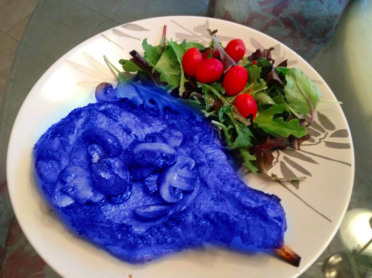
But look how CLEVER it is! Really, it’s YUMMY.
When I wrote my post Five Mistakes Killing Self-Published Authors, I did get some push-back regarding archetypes and three-act structure. To be clear, I never said, “All authors must adhere to boring and predictable rules that turn a story into a ridiculous trope.” Nor did I say, “You can only write a good book if you reverently follow every rule.”
I merely stated that we need to understand the basics before we can get to creating “art.” If we don’t, we’re relying on “happy accidents.”
If we don’t understand the rules, we don’t know how to intelligently and artfully break them. Maybe we will write something unique and successful without ever understanding POV. But then how do we duplicate that success if we don’t know how we created it in the first place? This is akin to going in the kitchen and tossing ingredients in a bowl without knowing what they are, how they taste or how they work together (or don’t). Maybe we’ll make something yummy…or maybe we’ll make a chemical bomb.

Image via Frank Selmo WANA Commons
When it comes to promotion, experience has taught me that if we are doing the latest fad? It’s already outdated. Algorithmic alchemy has a short shelf-life and I predict that soon it won’t work at all. Automation is ignored, spam filters are better at eating newsletters, and people are drowning in FREE! This means we need to be vigilant to grow, even in areas where we are fearful or weak.
I’m blessed to know thousands of writers, many of them legendary. The interesting thing I’ve found, is that normally the most talented writers, no matter how many zillions of novels they have sold have something in common. They continue to learn.
Last week, I was on the phone with a writer most of you would recognize. He was telling me of the books he was reading to help his current project, the social media and computer books. This author is a widely recognized genius. His books have been made into iconic movies and even assigned to college students. But, despite all this success, he’s wise enough to appreciate that, if we want to master our craft and thrive in our profession? We must always refresh and be open to new works, ideas and techniques.
For instance, craft evolves as readers evolve. Marketing doesn’t stay static. We need to always keep our fingers on the pulse of change and be open to getting out of that comfort zone.
In my career, I’ve read countless books, but these are the ones I would recommend as a staple in any writer’s library. Maybe you can use Christmas money or gift cards to begin stocking your resource library.
For Structure:
Hooked, by Les Edgerton
Scene & Structure by Jack Bickham
Plot & Structure by James Scott Bell
The Writer’s Journey by Christopher Vogler
Story Engineering by Larry Brooks
Save the Cat by Blake Snyder
For Character Development:
The Art of Character by David Corbett
The Emotion Thesaurus by Angela Ackerman and Becca Puglisi
I STRONGLY recommend Angela and Becca’s Positive Trait Thesaurus and Negative Trait Thesaurus. In fact, I think you get a deal if you buy them all together. Do yourself a favor. These tools will keep your characters psychologically consistent. When you do want to vary or surprise, these books can help you do it artfully. We don’t want readers thinking WTH?
That is bad.
The Sociopath Next Door by Martha Stout
Mind Hunter by John Douglas (Profiling is good for the FBI and writers)
DSM-5 (Diagnostic & Statistical Manual for Mental Disorders 5th Edition) Helpful for characters, dating, the workplace, and family reunions ;).
For a Swift Kick in the Pants:
The War of Art by Steven Pressfield
The Successful Novelist by David Morrell
Linchpin by Seth Godin
Mastery by Robert Greene
Outliers by Malcolm Gladwell
Failing Forward by John Maxwell
Guides for Social Media:
Rise of the Machines—Human Authors in a Digital World by Kristen Lamb (of, course, LOL)
Purple Cow by Seth Godin
The Tipping Point by Malcolm Gladwell
Predictably Irrational by Dan Ariely
Buyology by Martin Lindstrom
I’ve read many other fantastic craft books and guides (often written by the same authors). I’m not listing them all because this is just what I recommend should be standard in our stores of resources. If you guys have any others you’d like to mention, I am always learning and growing, too. Feel free to mention them in the comments!
I LOVE hearing from you!
To prove it and show my love, for the month of January, everyone who leaves a comment I will put your name in a hat. If you comment and link back to my blog on your blog, you get your name in the hat twice. What do you win? The unvarnished truth from yours truly. I will pick a winner once a month and it will be a critique of the first 20 pages of your novel, or your query letter, or your synopsis (5 pages or less).
Will announce December’s winners tomorrow. Sorry. My check-up took three and a HALF HOURS (which is why I only go to doctors about once a decade if I can). I apologize.
I hope you guys will check out my latest book Rise of the Machines–Human Authors in a Digital World and get prepared for 2014!!!!


January 3, 2014
Are Some Humans Born to Bully? Born to Be Victims? Can It Be Changed?

Image via Flickr Creative Commons, courtesy of Anamorphic Mike.
One of the reasons I am SO HAPPY you guys take the time to comment and share your thoughts is your insights often highlight areas I might not have thought to address. A commenter Mr. Dandylion replied to my publishing predictions for 2014 with darker thoughts, which included this phrase:
“A new author will commit suicide after a sustained online bullying campaign, most likely stemming from Goodreads; it will cause major headlines and public anger.”
Those words hit home and made me think. Granted, as a writer, I’ve experienced my share of trolls and (gratefully) only two LOONIES. But I have too many author friends (including NYTBSAs) who’ve been victimized by flash mobs of cyber-bullies. I’ve also had blogger friends who wrote on very innocent topics randomly victimized by gangs of trolls for seemingly no reason.
Oddly, when I tried to research bullying and bullying resources for yesterday’s post, I was taken aback at how most of the tips were for kids, teens and parents. The problem is that (as MANY commenters shared yesterday) bullies don’t go away. They grow older and often more vicious.
Often these creeps are on-line, in church, in critique groups, clubs and in the workplace. After six years in Rotary, I left because of bullies. They had stolen all my joy for public service…so I took my passion for helps elsewhere.
[image error]
Their “future boss.” Image via Flickr Creative Commons, courtesy of Thomas Ricker.
Another commenter, Lloyd Lofthousel was thoughtful enough to share this link in the comments; a NY Times article about the study of aggression and how the actual makeup of the brains of aggressive teens is vastly different from those of non-aggressive teens. Aggressive teens demonstrated heightened activity in the pleasure centers of the brain when shown images/films of acts of violence and cruelty (images that would have repulsed the rest of us).
Granted, this is a very small study but it, again gave me food for thought. This study made me think of a recent article in Discover by Dan Hurley; Grandma’s Experiences Leave a Mark on Your Genes (which I highly recommend you read in full).
Is DNA REALLY at Fault?
Before we go too far, I am not in the camp of “Blame DNA or Blame Mom.” We are humans not holly bushes and we have the power of choice. But neuroscience and genetics might offer insights and tools for how we as a culture can feed the good and starve the bad, so to speak.
According to the article, Moshe Szyf, a molecular biologist and geneticist at McGill University in Montreal and Michael Meaney, a McGill neurobiologist married their theories and work and pioneered a new area of study, which came to be known as epigenics.
These two scientists posited that nature and nurture were highly integrated and also that humans might carry genetic memory through generations. I confess I am no scientist and this is a Spark’s Notes for discussion, but it is fascinating. As a blog, this IS immensely reductive, so forgive me. But the theory is interesting for debate.

Image via Flickr Creative Commons, courtesy of Andrea Laurel
According to this new research, we all have DNA (duh), but what Szyf and McGill noticed was our spools of DNA required something “extra” to activate certain genes. One of these extra elements is the methyl group, which, “works like a placeholder in a cookbook, attaching to the DNA within each cell to select only those recipes — er, genes — necessary for that particular cell’s proteins. Because methyl groups are attached to the genes, residing beside but separate from the double-helix DNA code, the field was dubbed epigenetics, from the prefix epi (Greek for over, outer, above).” Discover, Hurley
In English, right?
Originally, epigenetic changes were assumed to happen only during fetal development. But Szyf and McGill wanted to probe further. Could grandad’s experience as a POW during Vietnam affect a grandson’s DNA?
“According to the new insights of behavioral epigenetics, traumatic experiences in our past, or in our recent ancestors’ past, leave molecular scars adhering to our DNA. Jews whose great-grandparents were chased from their Russian shtetls; Chinese whose grandparents lived through the ravages of the Cultural Revolution; young immigrants from Africa whose parents survived massacres; adults of every ethnicity who grew up with alcoholic or abusive parents — all carry with them more than just memories.” Discover, Hurley
Of course, what was really interesting about this article is it gives us good reasons to believe we aren’t at the mercy of DNA or methyl groups. Methylation apparently can be changed. Just like a diet of fried Twinkies can activate cancer genes, growing up in a stressful, neglectful household can similarly activate traits for suicide, depression, aggression, etc. by methylating those parts of the DNA.
This, I feel, is how we can see either generational traits continue or cease. In my own experience, I grew up in a Jerry Springer household. Fighting, yelling, abuse was the norm. I remember visiting friends’ houses and being blown away that there wasn’t non-stop crackling tension and arguing.
Thus, when I grew up to become a parent, I made it a point to maintain peace and consistency.
Whereas I was a high-strung, neurotic, fearful child, who suffered night terrors and sleep issues for years, The Spawn is happy, calm, gentle and can sleep anywhere. Yet, as parents, we have ZERO tolerance for people who want to infuse stress and chaos into our lives. This has meant terminating old friendships and even avoiding contact with certain family members.
Is Our Society Birthing Bullies by Tolerating and Ignoring Them?
I probably love watching Discovery ID more than is healthy (hey, I AM a writer). But one common theme does emerge when studying criminals and, specifically, serial rapists and killers. They often begin small. If they aren’t caught or properly counseled/punished early in the cycle, they grow increasingly emboldened.
This lack of consequences fuels a growing narcissism that “they can get away with anything” (generally until they are finally apprehended or grow bored and turn themselves in so they can write books from prison and be rewarded for being psychos).
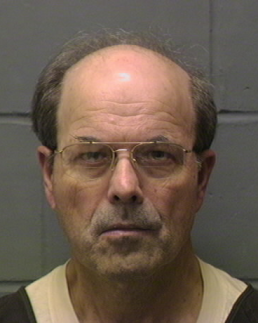
BTK Killer Dennis Rader. Image via Wikimedia.
I feel when we don’t stand up to bullies, when we give children advice like “ignore them and they will go away” this feeds the rush bullies so enjoy (and crave). The rush then only bathes the DNA in more of these methyl groups because the bully has been able to create chaos and upset and get away with it.
***NOTE: I feel we aren’t teaching children how to properly ignore bullies. We need to guide children how to remain peaceful, happy and continue life, not hide in a library and stop participating in school out of terror. This only FEEDS more intense bullying.***
I am making this arm-chair assertion based off the article, but according to this research, those who have a proclivity for violence—when subjected to (or allowed to create) stressful, chaotic and aggressive atmospheres—only get worse. The negative environment increases the methyl bath that continues to activate certain negative genetic traits.
To extend the logic, when major blogs allow trolls to rant and throw furniture in the comments without censure, it’s gasoline on the fire of what’s fueling them to begin with. When bullies can make someone retreat from the Internet, stop blogging, hide, they WIN…and grow even MORE emboldened and continue searching out even more targets to terrorize to feed the rush.
When the office bully can attack someone at the copy machine and not be fired? This emboldens the bully and, like any addiction, it generally requires larger doses for the same high.
I think this is why ignoring trolls in the comments, deleting them and refusing to feed them does often work. They aren’t getting the desired response that gives them the dopamine rush of “winning.” It’s also why I believe they disappear when faced with a wall of loving, caring people who support the victim. Their positive energy disrupts the chaos and fear the bully craves.
It is also why arguing or fighting with an on-line bully generates the opposite effect—it makes trolls CRAZIER, because we’ve chosen the wrong form of confrontation. When we “fight back” we give them the negativity they need.
Not all confrontation has to be aggressive ;).
The Counterpoint—Can Victims Be Healed?

Image via Flickr Creative Commons, courtesy of Ben Swing.
Methy groups (according to the research) don’t only affect those who are aggressive. Methylation can also activate depression, anxiety, codependency, etc. Often dysfunctional families are made up of aggressors and victims (I know that was my case growing up).
For every family bully, there are passive members dancing around trying to appease The Great Volcano from erupting. Clean the house a certain way, don’t have an opinion, be invisible and cater to every need Mt. Volcano has and he/she won’t blow.
Which is crap, btw, and for another blog.
Yet, one of the interesting observations I’ve made as the WANA Mama is that many shy, frightened, even victimized writers have found tremendous healing by being part of a large group that focuses on love, support and service. They’ve become brave enough to blog, to post, to write, to publish, to *gasp* have FUN because there is a different kind of family offering a very different type of energy.
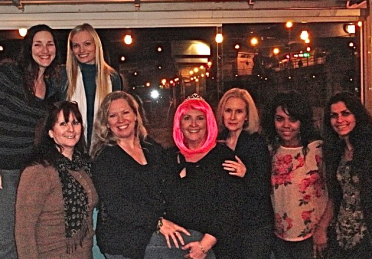
WANAs at play at Huntington Beach…
When authors have life beating them up? They have a safe place. When an author’s family, spouse or friends are being cruel or critical? They can come to us. When a troll mob is on the attack? The WANAs can step in and diffuse the hate. Darkness can’t help but retreat when faced with light. Love is more powerful than fear.
What Can We DO?
Regarding this discussion on neuroscience, I believe we can change behaviors. Deny the hateful the chaos they seek and provide the love and tranquility for those who need it. Changes in environment can make the aggressive more empathetic and the cowed more confident.
But how?
Rethink Cyberspace
I feel there are many areas of life where certain behaviors are simply NOT tolerated. As I mentioned on Facebook yesterday, Amazon, Goodreads, Huffington, Yahoo, etc. are on-line, but they ARE places of business—not a free-for-all-forum where anything is permitted.
Amazon sells, well…everything. But major blogs count on ads to thrive and grow. If people grow fearful or weary of trolls? They’ll move on to blogs where they aren’t afraid to comment. This means the site will have lower hits and no one will want to advertise…and then the site goes away.
We all have rights. But my RIGHT to swing my fist STOPS where your nose begins.
I have the right to complain. I DO NOT have the right to scream, yell, shout obscenities, and stalk and abuse the staff. If I went to a restaurant, I have the right to complain about the food or the service. But, if I screamed obscenities and attacked everyone in range verbally, do you guys think the manager would say, “Oh just ignore her”? NO. He’d toss me out on my butt and call the cops if I refused to behave or leave.
And if I gathered all my hateful friends to mob-attack the restaurant, would I be allowed to continue with this behavior? NO. I’d be sitting with my jerk friends in jail.
Take Charge of Our Blogs—Moderation is Paramount
I think as bloggers, we can be diligent to not allow abuse on our blogs. I guest-posted for a big author one time and a commenter was just INSANE and going for my throat…and the author allowed it because of “freedom of speech.” I never blogged there again.
Big blogs like Huffington, etc. need to increase moderation and have a Code of Conduct for commenting AND STICK TO IT. People can disagree, but they cannot act in any way that would land them a ticket or in JAIL if this was in person. If these blogs don’t take moderation more seriously, businesses won’t want to advertise there because the clientele (readers/commenters) has been sacred off.
Strength in Loving Community
Those of us who want to enjoy the Internet need to find a community of friends and support. WANA is of course an option, but there are surely others. Start your own. Be the light ;).
Positive Confrontation
Boundaries are crucial for any healthy relationship. Refuse to tolerate hateful comments on social media. I delete people who are offensive or out of control. I then politely message them and tell them I am happy to leave their comment if they can rephrase respectfully. If they refuse to stop peeing on the digital furniture? I report and block them or unfriend.
Be Professional
We cannot please everyone. Art is very subjective. We can never write a book everyone loves. Bad reviews happen, and, as professionals, we need to put on our Big Writer Pants. We cannot endure, let alone succeed in this business if we have the skin of a grape.
Yes, writers need to feel safe to publish, but reviewers also need to feel safe to review. Just because they don’t like a book doesn’t automatically make them a bully or troll. If we get too many bad (but thoughtful and respectful) reviews? We might have jumped the gun and published too soon. Maybe we need to pull the book and rerelease with better editing. Or try again.

Image via Flickr Creative Commons, courtesy of Mark Roy.
I know as an editor I’ve had writers go NUTS because I didn’t say every word was unicorn glitter. This is a profession not a playpen. When I was a neophyte, I got a lot of bloody noses in critique (but they were right). Honest feedback is what helped me get rhino-skin and become a better writer. It happens. We grow.
We can’t grow if we aren’t open to critique. Also, there comes a point when we have to brush things off. People have the right to an opinion (and they aren’t always correct). We don’t have to listen to and follow every opinion or we will end up with crappy books-by-committee.
So what are your thoughts? I don’t think we are at the mercy of nature or nurture. I believe we still have choice. But do you think we can change the future, no matter our genetic predispositions? Do you think we as a society or greater community could help drive that positive change? That maybe we could deflate bullies and rehabilitate the abused? What are for thoughts on nature-nurture? Were you from a crazy family too and yet managed to break free with your own kids? I like to think we can change the world, but blind optimism is my superpower :D…
I LOVE hearing from you!
To prove it and show my love, for the month of January, everyone who leaves a comment I will put your name in a hat. If you comment and link back to my blog on your blog, you get your name in the hat twice. What do you win? The unvarnished truth from yours truly. I will pick a winner once a month and it will be a critique of the first 20 pages of your novel, or your query letter, or your synopsis (5 pages or less).
Will announce December’s winners Monday. I have a lot to go through. Good problem :D.
I hope you guys will check out my latest book Rise of the Machines–Human Authors in a Digital World and get prepared for 2014!!!!


January 2, 2014
Brave New Bullying: Goodreads Gangs, Amazon Attacks—What Are Writers to Do?

Image via the movie “The Purge”.
Today is a tad of a touchy subject, but in this New year, I want everyone to have a the greatest gift any of us can have…peace. Bullies, in my opinion, are among the lowest known existing lifeforms. I wouldn’t want to insult cockroaches and fleas by drawing a comparison.
Kristen’s History With Bullies
I grew up most of my life being bullied. I switched schools at least once a year and there was always a new gaggle of Mean Girls to make my daily life a veritable hell. I think this is why I grew to love books. I skipped school so much (to seek sanctuary at the public library), that I’m fairly certain I’m the reason for the current Texas truancy laws.
I couldn’t get out of bed. I became ill at the thought of even walking through the front doors of my school. I was poor and these girls in their designer clothes who drove their BMWs to school took great joy in throwing away what little clothing I had when I was at soccer practice. To this day, my ankles are pretty much destroyed because I have very narrow feet to fit.
These bullies stole my expensive Nike cleats that provided proper support, and threw them away. I was ashamed to tell my grandparents what really happened and pointed to the cheap $20 shoes that were far too wide (I have AAA feet). That earned me a massive third-degree sprain and four months on crutches. My ankle has never been the same.
I never really dated. I remember there was a boy (popular, of course) who I had a crush on when I was 15. He kept asking me out, but I knew I was being played. Finally, he seemed so intent and sincere that he did like me, I finally went against my gut and agreed to the date. He was supposed to come pick me up at 6:30 to go to a movie. I dressed up in one of the few nice outfits I had…and waited. 6:30 became 7:30 which became 8:30 and at 9:00 I gave up. I went to bed, then realized what day it was…April Fools.
I cried all night.
The next day theses kids gathered in the halls to laugh and point at me, throw wads of paper at me. They jeered that I thought I was so smart but stupid enough to believe this super popular boy would want to date a piece of trash like me.
I was never mean to anyone. I was oddly quiet, alone and read most of the time. Yet, I was a never-ending target for hatred I didn’t understand. When I went to the school officials, they ignored me. “Girls will be girls.” “Kids will be kids.” I know people love teachers, but my teachers only patted me on the head and benevolently tossed me back to the wolves. They gave “great advice” like ignore them, but it only seemed to fuel even more hate.
No one dared be me friend, and I couldn’t blame really them. They didn’t want to be added to the blast radius.
Bullies Don’t Stay in High School
I’d like to say bullies went away. I worked nights and never talked to anyone on college once I broke my back and lost the one refuge I’d ever had, AFROTC. I made it through the final four years of college never having friends aside from my professors. I had terrible social anxiety.
When I graduated and joined the workplace, I soon discovered bullies just grow older and more cruel. I’m certain Human Resources must have some hidden rule that they must hire at least one tireless jerk to torment their fellow workers.
Yes, part of why I left sales was my health. I threw up on the way to work every day. Why? A bully. She ruled the office and everyone feared her. She’d even once assaulted someone at the copy machine. I was responsible for a 2.5 million dollar quota and this person would make sure my orders were “accidentally” sent to the wrong place, my samples would get “lost in the mail” and important documents would disappear.
I kept having to change the lock on my office because this person thought nothing of helping herself to my personal belongings. One time, I’d worked months on a detailed presentation I had to give at the national meeting. I went to lunch and forgot to lock my office. She deleted the entire thing (though there was no proving it, of course).
Seven weeks of work had to be redone in 24 hours.
We had a major contract that came open. Business we’d had for a couple decades was being offered to our competition. I drove to Mississippi once a week for months to ensure we maintained the contract and won the bid. Finally, I got the green because they liked me. All I had to do was send the samples to a certain location. The office bully deliberately mailed them to the wrong address (yes, she was the only one with the power to send out products). I have no idea how many people lost their jobs because we lost this major contract, and I was the salesperson so the blame was square on me.
And there was NO getting rid of her. I went to my boss, to the plant manager, to Human Resources and they acted as if I was just being sensitive. I left. She won. The factory closed. But what kind of person is willing to go to such extremes to hurt ONE person, that she takes out the jobs of others and then even her own? Why would a company tolerate this?
I’ve never found a satisfying answer.
I think that’s one of the reasons I have been so tireless when it comes to building the WANA Community. I spent so much of my life alone, lonely, afraid and I never wanted anyone to feel the way I had for so long.
Brave New Bullying
Now we live in a Digital Age and bullies abound. The Internet gives them access to torment us 24-7 no matter where we go. I was so thrilled the day I was asked to blog for Huffington, yet unlike here, I have no control over the tone of the comments. There are people who are simply made of spite and hate and they will take it out from the safety of a computer behind the anonymity afforded by monikers. Now when I post, I simply scan and, if anything is hateful in tone? I won’t even read it.
Sad to say, this is why I don’t read reviews before buying any book. There are too many sock puppets and trolls. Goodreads and Amazon are RIFE with bullying. I’ve had friends bullied on blogs and even once had someone start a hate blog directed toward me, “Kristen Lamb The Face of Misandry” which is “Man-hating”, btw. I had to look it up.
It’s sad to say, but when researching for this topic, it seemed most of the information was for kids, schools and teens. But bullies never go away. They often can’t be stopped, but maybe we can make it tougher for them to spread their cruelty.
What To Do
Be YOU—Don’t Let Bullies Steal Your Peace or Your Book Sales
First of all, use the name printed on your books. A moniker or a pen name won’t stop the hate. It’s still you. If someone called me names and ruthlessly attacked my character it wouldn’t matter if it was Kristen Lamb’s Blog or Penelope Fluffernutter’s Blog. It’s still me behind the computer. When we try to hide behind a moniker to protect against the inevitable, all we do is make it harder to sell books. The bullies win. They can steal your peace and maybe even success.
When we get off the Internet because of these cretins, they win. It’s a “blaming the victim” mentality. If your skirt wasn’t so short blog wasn’t there, you wouldn’t be raped harassed by trolls. This is why I DO recommend a WP based site. There is this marvelous TRASH function.
Illegitimi non carborundum…
Keep Records
If you get hateful, threatening messages take screenshots. Save e-mails. If the troll is motivated enough they can easily slip into an area that can give you power legally. But, proof is what will help your case.
Manage Your Blog
I don’t allow hate. I am always open for respectful disagreement, but if someone gets out of control? I delete their comments. People need to feel safe to comment on my blog (and yours), and bullies will shred the fabric of your community. It’s our job to keep them in check. Set boundaries and refuse to tolerate abuse.
Stand Up for Friends
If you have a writer friend who’s being bullied, gather together and, when Amazon asks if a review is helpful? Click NO. The WANA Community is massive. Let us know. We are happy to stick up for you, and a troll might be able to harass one or two pals who come to your aid, but a few thousand is a tougher challenge.
Report and Block
Report abusers on Facebook. The guy who started the hate blog about me wasn’t just harassing me, he was harassing all my friends who commented on my wall. He was PSYCHO. I went to Facebook and had him banned. I blocked his comments and profile (until FB could take it down).
DO NOT ENGAGE
Don’t feed the trolls. Negative attention is still attention. Often trolls will leave seething comments to upset people SO much that they HAVE to go to their blog/website to see WHO this JERK IS. It’s the only way they can get hits and comments and they feed on negativity. Starve them.
Hire a Professional
If you’re worried about your safety or your family’s safety because someone has gone THAT nutso? Contact Jay Donovan at TechSurgeons. Jay is an amazing human being, a tireless champion for writers and he IS The Digital Dark Knight. He’s a computer genius who can have said troll chasing his own @$$ down a hole of frustrated nothing. There are ways to protect yourself digitally and Jay is a master of security. Even if you want to take some preventative measures, talk to Jay.
Many of you know I am NOT a fan of pen names. What you may not understand is I’m not a fan of pen names, because a different name alone isn’t enough. Worse, it can provide a false sense of security. Writers are locking the screen door thinking that’s going to keep out the motivated ax murderer.
There are sound reasons for having a pen name. I advise against it most of the time because friends, schoolmates and family can be powerful mouthpieces and very helpful. A pen name limits how much of that energy we can harness and dilutes focus. BUT, if you DO need a pen name for safety, security, etc. TALK TO JAY. Again, a different name alone isn’t enough. An eight-year-old with decent Google skills can find who you are without the skills of someone like Jay helping you.
Speak Up
I don’t know if this is helpful, but it is a start and I signed it. It’s a petition to Goodreads to monitor and have a Code of Conduct for reviews. I hate to say it, but if Goodreads doesn’t start protecting writers from abuse, then we can remove our books. Don’t think they would last long with no authors and, since Amazon owns them, they might be more inclined to listen.
In the end, trolls (sad to say) are often a sign we are doing something right. Get ten trolls and I think we are officially a celebrity. Learn to un-see. Focus on those who love you. Join our WANA Community (WANA stands for We Are Not Alone, information here). We are a great refuge and support system. You can join us on Twitter at#MyWANA, on Facebook or even WANATribe (a social network for creatives). I have ZERO tolerance for trolls and have smiting powers.
I know it can feel very defeating sometimes, but a great circle of loving friends who have your back is a great start. Refuse to feed the trolls your peace, success and happiness. They exist, but together we are stronger.
What about you? Have you been bullied? Did you find any tactics that were effective? I am no expert, so I would LOVE any suggestions.
I LOVE hearing from you!
To prove it and show my love, for the month of January, everyone who leaves a comment I will put your name in a hat. If you comment and link back to my blog on your blog, you get your name in the hat twice. What do you win? The unvarnished truth from yours truly. I will pick a winner once a month and it will be a critique of the first 20 pages of your novel, or your query letter, or your synopsis (5 pages or less).
Will announce December’s winners Monday. I have a lot to go through. Good problem :D.
I hope you guys will check out my latest book Rise of the Machines–Human Authors in a Digital World and get prepared for 2014!!!!


December 31, 2013
Consolidation, Nooble & Agents Who CARE—What’s Ahead for 2014 in Publishing

Image via Flickr Creative Commons courtesy of Mr. Muggles.
I promised yesterday, I’d offer up some predictions for publishing in 2014. I don’t know if these are “predictions” or “suggestions” but I am, at heart, an eternal optimist. As I’ve said many, many times, this is a WONDERFUL time to be a writer. It’s a Golden Age of Publishing if we’re willing to embrace the new. Yes, there are challenges. I might be an optimist, but I’m not a moron (okay, that time I accidentally drove to Missouri doesn’t count).
There are new perils ahead, ones we won’t know about until we step both feet in them. In ways, writers are The Lewis and Clark Expedition Literary Edition unfolding in 0s and 1s. This part of why I implored yesterday for writers to be involved in their social media communities. This new paradigm is awesome, but predators abound.
Sadly, there will be more wanna-be publishers, more bad books, more phony reviews, more bullying, more competition, and discoverability will only get tougher…exponentially. But, the flip-side is that writers are making more money, novelists can finally make a living, moth-balled novels are seeing new life and creating new fans, and unique and creative genres are being born. Additionally, forms of writing nearly rendered extinct (poetry, novellas, etc.) have been given new life and authors have a lot more choices and control. We trade one set of problems for new advantages (and…yes…new troubles).
Like the dot-com burst of the 90s, this paradigm will eventually find its way. New gatekeepers will emerge and the market will stabilize…until the next revolution. But until that time…
First, Consolidation is King
Back in The Olden Olden Days, humans went to the butcher for meat, the baker for bread, the smithy for nails, and the tailor for clothes. Then Super Walmart was invented (okay grocery stores then supermarkets might have “paved the way” *rolls eyes*). As humans became more pressed for time, consolidation became vital for competitive edge. Now, we don’t have to trek to the liquor store for the New Year’s Eve champagne when we can simply pick it up at the supermarket with the very last fattening food we’re eating EVER….
….okay, until February.
Consolidation is everywhere. Gaming systems no longer just play games. Try ordering a movie on your 1986 Atari. Want to post on Facebook or peruse You Tube? A Nintendo 64 probably won’t do the trick. In 1990, if we said, “Wow, I need to take Christmas pictures. Let me get my phone!” Men in white coats would show up uninvited and take us away for a “vacation.”
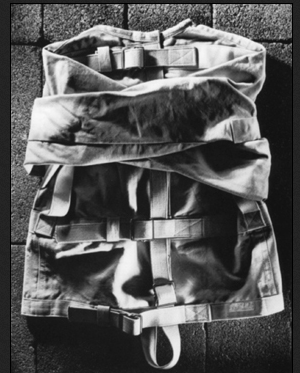
Want to take pictures with your PHONE? Might we suggest one of these…
Gaming consoles (XBox) now stream video, allow us to access movies, Amazon, social media, and even shop. Phones are no longer just phones. They play music, manage bank accounts, surf the web, take pictures and video, and entertain toddlers (um, Angry Birds?). We can even run a business remotely using various applications. Try that on THIS.
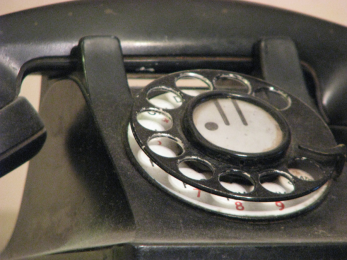
Image via Flickr Creative Commons, courtesy of Robert Huffstutter.
Aside from calling people and generating a seething hatred for those unfortunate souls with too many 0s in their phone numbers? THIS bad boy (above) was good for calling people and letting them call US…and maybe braining a burglar or dazing a Florida cockroach long enough to shoot it with a GUN.
These days, more and more people rely on smart phones and tablets for everything.
Why do I mention this? Because the future of physical bookstores relies on partnering with other types of retailers. Um, consolidation?
The closest Barnes & Noble to me is in the heart of the BUSIEST FREAKING MALL in DFW, Texas. I am simply not that motivated. What if indie bookstores or Barnes & Noble took the path of Starbucks? Tuck that sucker (a mini-version) in a Target, supermarket or a Costco. I NEED food. Books? Eh, shop on-line. Stick them TOGETHER and lure me with the SHINY. I am SO THERE!
Much like I can buy wine at my local Krogers, why can’t I have a choice of more than a handful of books on one aisle? Make life easier. Gas is expensive and I don’t OWN CLONING TECHNOLOGY, BUT MY LAUNDRY DOES.
*left eye twitches*
This dovetails into my first prediction.
Prediction #1—Kiosks and Microstores Will Gain Traction
Blockbuster is dead. Alas, Red Box remains.
The trade paperback is fairly standard, so digital kiosks are a great alternative. Make the Espresso technology a lot like Red Box. A touch-screen panel to peruse recommended books then pay for either a) a download or b) a rental (limited e-book that expires—integrating the library into this business plan) or c) a printed book (with a coupon for 15% off a latte or grocery purchase over $50, of course).
A “rental”? Yup. Wouldn’t that be great for those books we were forced assigned to read in high school and college? And, if we “rent” the book, this can count towards the purchase of the book if we do want to actually keep and reread Moby Dick. Win-win.
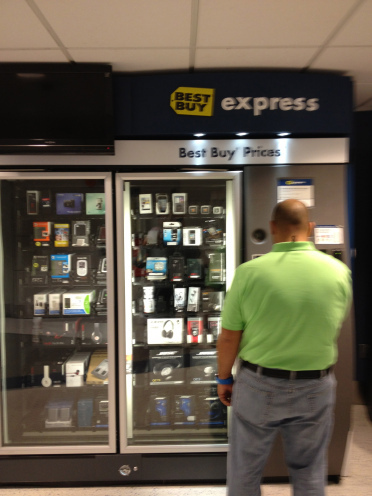
If Best Buy will do this, why not B&N?
Microstore? YES.
Think of the small stores in airports. I’d much rather have a small store with an educated and well-read staff to help guide what to read than to throw chance to the wind on-line. Microstores can still stock the most popular paperbacks/hardbacks/collections, but then they can guide consumers what to load on their new devices (and maybe even help) or print on the Espresso machine.
The largest consumer group is the Baby Boomers. An educated bookseller could not only guide what to read, but also demonstrate how to upload books to the new device. Maybe even load some freebies for great customer service? *wink, wink*
These booksellers can act as gatekeepers to help modern consumers avoid the digital slush pile. Indies, self-pub and traditional would be on a level playing field. Good books would be recommended by staff members who READ and who are PASSIONATE about BOOKS. Pay the book salespeople a flat commission. Who cares if they recommend James Patterson or Joe Schmoe Patterson? They sold a book and if they want customers to return and offer more commission? They’ll probably want to recommend good books.
Prediction #2—Booksellers Cultivate a Culture of Reviewers
Microstores can also encourage reviews in a way authors can’t. I’d love to offer sweet prizes for reviewing my book, but it’s just too…what’s the term? Creepy. Sure, I want reviews as much as the next author, but it’s a fine line that can get writers in ethical trouble. A microstore wouldn’t have this issue. They could actually cultivate a culture of reviewers.

Original image via Flikr Creative Commons courtesy of Sodanie Chea
Micro Indie Booksellers could offer incentives to the best reviewers who write ACTUAL reviews (no matter what book it happens to be, thus removing problem of favoritism). If people act like trolls or play sock puppet? Doesn’t count. The more the customers review, the better (educated) reviews they post? The more bonuses they receive. Booksellers can reward consumers for being active and ethical citizens of the reading culture.
This helps the microstore, the bigger retail outlet (who rents space and partners with discounts), the consumer struggling to save time and who needs guidance, and it helps authors get REAL reviews. Not this, pay us to read your stuff and say something nice nonsense. It’s a positive way to combat bullying and encourage thoughtful, genuine reviews.
Prediction #3—The Boutique Boom
We already touched on this when we discussed micro-trends, but part of why Big Publishing is hemorrhaging is because small is the new big (thanks, Seth Godin). Big Publishing makes most of its profits off the mega-trend, but mega-trends are dying. Amazon has grown exponentially because it harnesses the momentum of millions of micro-trends. Authors don’t have to reach millions of people to make a good profit/living (if one takes away the needless waste of the old paradigm). Publishers don’t either ;).
Prediction #4—Strong Indie Houses Will Replace Big Publishing
Granted, we live in a time when everyone can be an author and everyone can be a publisher, but this business is tough. It requires capital, business savvy, organization, innovation and raw tenacity. This means a lot of indie publishers won’t last, and the ones that do will add increasing value. Because these new publishers are innovative, lean, offer higher royalties, and aren’t married to massive Manhattan overhead and paper, they’ll eventually replace NY publishing (and we hope they’ll learn from The Big Six’s mistakes).
When one considers the current business trajectory? Bookstores, libraries and foreign markets are becoming increasingly friendly to indies. They have to in order to survive. Loyalty to NY only goes so far when one is facing extinction. What will NY do when indies can do everything they can and offer lower prices to consumers and higher pay for authors?

Image via Flikr Creative Commons courtesy of Robert Ellsworth Tyler
Prediction #5—AP Reviewers Will Be Forced to Take ALL Authors Seriously or Perish
As is stands, it’s almost impossible for a self-published author to score an AP (Associated Press) review. Yet, when we’re now in a time when non-traditional authors are matching or outselling traditional authors? How long can the AP remain silent about the books people are reading? If they don’t dive in? Book bloggers will happily replace them, and maybe they should. The press was never meant to solely be a mouthpiece for conglomerates.
Prediction #6—Social Norms Will Trump Market Norms
Freebies, give-aways, contests, algorithms, coupons, are fine, but alone? Invisible. Writers must be engaged personally and create community or it’s Career Roulette. We (consumers) don’t want any more deluge of free stuff. We are drowning in FREE. We don’t want more newsletters crapping up our In-Box. We don’t want link spam.
We want connection.
The 18th-20th century world was actually a historical anomaly. The factory model, the TV-Industrial Complex, the World of Big Business and Bigger Gatekeepers is GONE. We’ve returned to our human roots. We want to laugh, talk, klatsche, and we gravitate to who we know and like. We humans are returning to our tribal roots.
Algorithms will be harder to manipulate, reviews tougher to fake, and promotions will grow increasingly invisible, especially as new emerging markets add even more competition to the din.
Prediction #7—Age of the Artist
Multimedia is the future. Books eventually have to be more than books (much like phones became more than phones). Consumers will gravitate to e-books with sound, music, images, quick reference, video, similar reading suggestions, etc. Artists working together will thrive. E-books can create communities where fans can become friends, talk, argue, and hang out.
Musicians? Make friends with writers and offer short music selections. Photographers and graphic artists? Writers need cover art and internal images. Videographers? Writers need book trailers that don’t suck. Also, short video clips can enhance the reading experience. Heck, team up and put together music videos for a book. Get creative!
We are ARTISTS. This means we cannot be automated or replaced by robots. ENJOY!
No, I am not saying paper will go away. It won’t. But when I bought an IPad for business, it was soon abducted by a two-and-a-half-year-old and I haven’t seen it since. The Spawn reads. A LOT. But he reads off the IPad, because he loves interacting.
Prediction #8—A New Breed of Reader
I mention the IPad, then quickly hear the cry of the, “But you’ll damage their BRAINS” crowd. Uh huh. Just like those record players paired with books damaged me when I was four. The interactive experience has always been there. In cave times, it was around a fire listening to a storyteller/bard. Later, book clubs, records, tapes, blah, blah, blah. Interactivity has always been there, only today, it’s been heightened to new levels.
And when I was that nerdy teen reading a paper book ALONE, what I would have given for a crowd of likeminded teens all over the world who shared my love for Dragonlance books and my passion for The Pawn of Prophesy. I love how detractors decry that technology makes people less able to socialize, because I was SO SOCIAL with my stack of paper books hiding in a corner of the lunchroom praying no one would notice me.
The new paradigm has finally accomplished what Big Publishing couldn’t. It’s made reading COOL and this trend will continue to grow.
Prediction #9—Barnes & Noble Needs a Sugar Daddy Bail-Out
Barnes & Noble has been on the downward spiral for a while. What I find funny is people feel sorry for them. Remember the 90s when they all-but-demolished the indie bookstore in Darwinian fashion? Seems like karma is coming back to bite, Blockbuster-Style. B&N is facing serious comeuppance now that the bully has met with someone capable of bloodying their nose. If they do survive, they’ll have to marry well. My bet is on two major suitors.
Suitor #1? Microsoft. And I am not alone in this assessment. Microsoft operating systems still dominate tablets, personal computers, and smart phones, so the Nook can be easily integrated into the operating systems of all Microsoft devices. Microsoft would take over the e-books and B&N would survive. Yes, Microsoft has dated dabbled, but never offered a ring.
Or perhaps, one day we will tell our grandchildren of grand two-story buildings with coffee shops inside and “business hours.”
In my day we had to get in a car and drive and find PARKING and look on actual SHELVES for a book *waves cane*.
Suitor #2? GOOGLE.
Apple’s relentless innovation has slowed since the death of Steve Jobs, and Android is taking them on. The Google-Android partnership has Apple on its toes in regards to automobile iOS systems. It’s the Siri-Google Smackdown! While Apple is fighting on that front, Microsoft could take a chunk out of iBooks with a B&N bailout (and give Amazon some competition at the same time).
Or, if we want to go for the most interesting Bailout-Marriage, why not Google Books? A SEARCH ENGINE marrying a BOOKSTORE? If Google can partner with Android, B&N isn’t exactly as wild of a partnership as it might sound. If Google-Android does win the Computerized Car Business, cars are now big into downloading entertainment. AUTOTAINMENT. Want to listen to an audio book on the commute? Want to synch your reading device while stuck in traffic or on a long road trip (not while driving, please)? Want to download a new book for the kids fighting in the back seat?
Nooble…
Um, Goo-Barnes…
Um…Boogle….
NOBLE GOOGLE is HERE!
Hmm, Noble Google. Kinda catchy :D. Though Nooble is cute.
Prediction #10—Agents Will Have to Innovate, Too
Agents. Yeah. I recall the days when conferences would pay big bucks for agents to attend…and then the agents refused to talk to authors. I can personally attest to enduring the brunt of daring to talk to those who’d come down from Mt. Olympus NYC to talk to me, a lowly mortal…writer. *shivers* They sneered that we made a typo in a query, yet couldn’t be bothered to even spell our names correctly in a rejection letter (been there). Agents tweeted lines out of queries as jokes. They laughed and mocked writers on-line worse than a den of high school Mean Girls, but now?
Wait.
Writers still have a job.
REVELATION! Agents need writers. Whouda’ thunk? Now, make no mistake, I think agents are awesome. We are wise to have a good agent. Many agents are tireless champions who should be paid better, but the old paradigm birthed a lot of prima donnas who forgot who paid their wages.
Some of the BEST people I know are agents. Laurie McLean (of Forward Literary) is not only a FABULOUS agent, but a marvelous human being and my friend. BUT, Laurie is there for WRITERS. She’s a warrior for good writers and great books, and there are many agents like her. In the new paradigm? Agents like these will thrive and they SHOULD.
Authors need allies and agents can help even the self-pubbed or indie author. Laurie is extremely forward-thinking and always has been. When I first taught social media in 2008? She was the only agent out of TEN who attended. She’s AMAZING at planning author careers. She can tell you when to self-pub (if it’s right for you/your work), then guide you to the best indie or traditional house (and deal) and then take your work as far as it can and should go.
She’s always on the lookout for the perfect path for each writer and every work (Red Sofa Literary, established by Dawn Frederick, is another fab choice). These folks do what agents should do! Agents like Laurie, Dawn and their teams will thrive and the others? Well, let’s hope they can learn and innovate ;).
What are your thoughts? Do my predictions make you happy or break out in hives? What do YOU see in the future? HOW do you do it? Because I had to drink three packs of Red Bull to see the future. What would you LIKE to see coming down the pipeline?
I LOVE hearing from you!
To prove it and show my love, for the month of December, everyone who leaves a comment I will put your name in a hat. If you comment and link back to my blog on your blog, you get your name in the hat twice. What do you win? The unvarnished truth from yours truly. I will pick a winner once a month and it will be a critique of the first 20 pages of your novel, or your query letter, or your synopsis (5 pages or less). Comments for guests get extra POINTS!
I hope you guys will check out my latest book Rise of the Machines–Human Authors in a Digital World and get prepared for 2014!!!!




